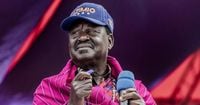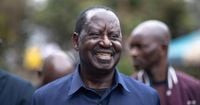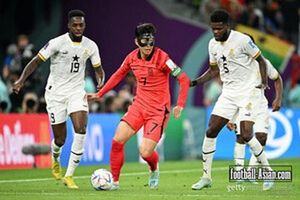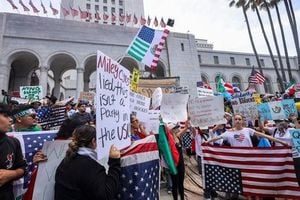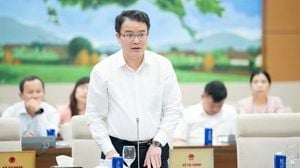Raila Odinga, the former Prime Minister of Kenya and a towering figure in African politics, died on October 15, 2025, while traveling in India. His passing at age 80, confirmed by Devamatha Hospital in Kerala State, marks the end of an era for Kenya’s political and social life. Odinga’s death, the result of a heart attack suffered during a morning walk, has triggered a wave of mourning across Kenya, with tributes pouring in from leaders and citizens alike.
According to Devamatha Hospital, Odinga collapsed and did not respond to resuscitation efforts. The news was met with shock and sadness both in Kenya and abroad. Indian Prime Minister Narendra Modi described Odinga as “a towering statesman,” echoing the sentiments of many who saw Odinga as a giant on the continent’s political stage, as reported by NBC News.
Back in Nairobi, somber scenes unfolded at Odinga’s home, where President William Ruto and other dignitaries gathered to pay their respects. President Ruto, who had recently signed a political pact with Odinga involving government policymaking and cabinet appointments, announced a seven-day national mourning period in his honor. This move was quickly followed by the Football Kenya Federation (FKF) suspending all league fixtures for the duration, a testament to Odinga’s influence beyond politics. As quoted by FKF President Hussein Mohammed, “Following the Government’s declaration of seven days of National Mourning in honour of the late former Prime Minister Rt. Hon. Raila Amolo Odinga, the Football Kenya Federation (FKF) has suspended all league fixtures scheduled during this period. We join the nation in mourning a great leader and passionate supporter of Kenyan football. May his soul rest in peace.”
Odinga’s commitment to Kenyan football was legendary. He was the long-serving patron of Gor Mahia Football Club, a role he filled with both passion and generosity. Gor Mahia, affectionately known as K’Ogalo, suspended its highly anticipated match against Posta Rangers, originally scheduled for October 20, in line with the national mood. The club expressed its sorrow, stating, “In accordance with the presidential directive for a seven-day national mourning period in honour of our club Patron Rt. Hon. Raila Odinga, the Football Kenya Federation has suspended all league fixtures during this time.” Odinga’s presence at local matches and his engagement with players and fans made him a beloved figure in the sporting community, as detailed by k47.co.ke and Pulse Sports.
But it was Odinga’s political journey that cemented his legacy. Born on January 7, 1945, in Kisumu, on the shores of Lake Victoria, he was the son of Jaramogi Oginga Odinga, Kenya’s first vice president. After studying engineering in East Germany, Raila Odinga returned to Kenya in the 1970s, teaching at the University of Nairobi and launching several businesses. His entry into politics was marked by activism against the one-party rule of President Daniel arap Moi in the 1980s. Accused of involvement in a failed coup attempt in 1982, Odinga was detained for much of the following decade, enduring harsh conditions and, by his own account, torture. He insisted, “While I had been involved in educating and mobilizing people to bring about change in Kenya at the time of the coup attempt, I never advocated violence.”
Odinga’s resilience saw him return to Kenya in 1992 after a brief exile in Europe. He quickly won a seat in the national assembly as an opposition lawmaker, galvanizing support among those disillusioned by corruption and poverty. His political career was defined by his relentless pursuit of democracy and multiparty politics. In 2001, he joined Moi’s government as energy minister but later played a crucial role in supporting Mwai Kibaki’s successful 2002 presidential bid. Ironically, Kibaki would become Odinga’s main rival in the disputed 2007 election, a contest that nearly saw Odinga claim the presidency.
The 2007 election remains one of the most contentious in Kenya’s history. Official results showed Kibaki narrowly defeating Odinga, with 46% to Odinga’s 44%. Odinga’s camp rejected the outcome, citing an unreliable electoral authority. Protests erupted, and violence soon engulfed the country, with ethnic tensions boiling over. Hundreds were killed, and the International Criminal Court would later investigate several high-profile politicians, including future presidents William Ruto and Uhuru Kenyatta, for their roles in the unrest. Odinga himself was never accused of inciting violence.
In the aftermath, a unity government was formed with Odinga as prime minister, a role he held from 2008 to 2013. His leadership during this period was widely credited with helping steer Kenya back from the brink and expanding the democratic space. Odinga ran for president five times over three decades, each campaign marked by fervent support and, often, controversy. His last bid in 2022, backed by outgoing president Kenyatta, ended in defeat to Ruto, after which Odinga alleged electoral fraud and led a series of street protests. In a 2017 interview with The Associated Press, Odinga defended such actions, saying, “If a regime is undemocratic, if a regime does not enjoy legitimacy, the people are justified to resist that regime.”
Odinga’s influence extended beyond politics and sport. He was instrumental in the creation of Kenya’s 2010 constitution, a landmark achievement in the nation’s democratic evolution. Earlier in 2025, he sought to lead the African Union Commission, though his bid was unsuccessful. Throughout his life, he remained a figure of hope and resilience for many Kenyans, admired for his tenacity and his willingness to challenge authority.
His passing has left a palpable void. The government’s decision to suspend public activities, including football matches, underscores the depth of national grief. Tributes continue to pour in from across the political spectrum and from international leaders, all recognizing Odinga’s pivotal role in shaping modern Kenya.
Odinga is survived by his wife, Ida, and leaves behind a legacy that will resonate for generations. His story is one of struggle, perseverance, and a relentless quest for justice — qualities that endeared him to supporters and earned him respect even from his rivals. As Kenya observes its period of mourning, the country reflects on the life of a man who, for better or worse, helped define its destiny in the post-independence era.
